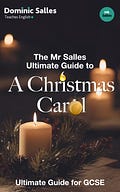Overall Comments
You know I like a conclusion to deal with the end of the novel, which this does. A really strong link to Dickens’ purpose.
The essay also satisfies my requirement to have 13-15 quotes for a grade 9 for AO1 references.
It deals with the whole text, so is level 6 for AO1 whole text analysis.
It always refers to the writer’s perspective - so, a great level 6 answer - grade 9.
In his didactic novella “A Christmas Carol”, Dickens explores the fear that can be caused by childhood neglect, especially in a school environment. He highlights the importance of the poor, and shows that the poor are completely at the mercy of the rich, and therefore it is the responsibility of the rich to help the poor, so that the poor needn’t fear an early death on earth, and the rich needn’t fear eternal death in hell!
My Comments
A good 3 part thesis, with a great contrast at the end.
Dickens presents Scrooge as being fearful of relationships. He is described as being as “solitary as an oyster”, which suggests that he is tough and strong seeming on the outside, and perhaps a little rough as a person. However, a Victorian reader would have thought that anyone would have valued their family, since it was a central part of life at the time. However, when Fred invites Scrooge to a Christmas family gathering, Scrooge dismissively exclaims “Bah, humbug!” This can be seen to be merely due to rudeness, or a lack of care. However, we can infer that there is a metaphorical softness to Scrooge, a weakness that leads him to this feeling.
My Comments
An ok analysis of the famous “oyster” quote, but it would be much better if you were able to link it to the idea of his weakness - which I admit is almost impossible with this quote.
Later on, the Ghost of Christmas Past sheds a light on the reason for his fear relationships: that he has never had them! As a child, we see Scrooge “lonely” at school, reading. We can infer that this childhood loneliness has merely led on to more of the same in his adult life. Dickens was a keen advocate for schools to focus on communication and love, rather than simply just learning facts, and Scrooge’s character shows why this is so important.
My Comments
A nice use of context to back up your argument.
Dickens shows a development in Scrooge’s love of people when Scrooge fears that Tiny Tim will die, and begs the Ghost of Christmas Present to “spare him.” This completely contrasts with his earlier attitude, when he said that when the poor die, they “reduce the surplus population.” It shows us that he now values the lives of people, rather than just thinking of them as “the poor.”
My Comments
This is where the essay shows off some real AO2 and AO1 skills, analysing quotes and then linking them from different parts of the text respectively.
The Malthusian theory of poverty being the fault of the poor was very popular in Victorian times, but Dickens wanted his rich Victorian readers instead to grasp the importance of caring for those who had less money. It could be argued that Scrooge fears the death of Tiny Tim because of the part that he has to play, since he hasn’t been paying his father enough to provide enough for a whole family. Scrooge clearly could face divine retribution for Tiny Tim’s death, but arguably, for the deaths of the adult poor as well, a fearful prospect which would also encourage the reader to consider their treatment of the poor.
My Comments
Very strong use of context to back up your interpretation - this gives you high AO3 marks. Even better if linked to a quotation.
Dickens also highlights Scrooge’s fear of death. The Ghost of Christmas Yet To Come is depicted as “gravely” approaching, “shrouded” and “scatter[ing] gloom”. The adverb “gravely” emphasises the importance of the ghost’s arrival, but also hints that he may have come to take Scrooge away, perhaps to eternal damnation. The noun “gloom” has clear connotations of darkness, but while in Stave One “Scrooge liked the darkness” as it was “cheap”, now his legs “tremble beneath him”. This shows that Scrooge has finally realised the threat to his soul due to his evil ways, and fears the consequence, and the reader hopes that he will make amends, if it is not already too late. However, Dickens suggests that while Scrooge clearly fears death, he may not entirely fear the Ghost, as he says that “he is prepared to bear [him] company.” This slightly reminds us of the old Scrooge, who was arguing with the Ghost of Marley, and shows that Scrooge has not yet been full changed by his fear.
My Comments
This is masterful AO2 quote analysis and equally brilliant AO1 linking quotes from different parts of the text. Top notch.
To read the rest of the essay, consider becoming a paid subscriber. The first week is free, and you can cancel any time.
Keep reading with a 7-day free trial
Subscribe to Mr Salles Teaches English to keep reading this post and get 7 days of free access to the full post archives.


